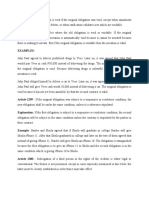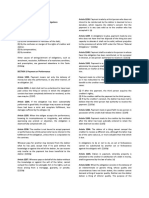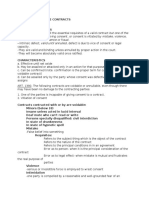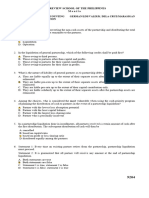Chapter 3 Section 4 Joint and Solidary Obligations
Chapter 3 Section 4 Joint and Solidary Obligations
Uploaded by
Lenny Ramos VillafuerteCopyright:
Available Formats
Chapter 3 Section 4 Joint and Solidary Obligations
Chapter 3 Section 4 Joint and Solidary Obligations
Uploaded by
Lenny Ramos VillafuerteOriginal Title
Copyright
Available Formats
Share this document
Did you find this document useful?
Is this content inappropriate?
Copyright:
Available Formats
Chapter 3 Section 4 Joint and Solidary Obligations
Chapter 3 Section 4 Joint and Solidary Obligations
Uploaded by
Lenny Ramos VillafuerteCopyright:
Available Formats
THE LAW ON OBLIGATIONS AND CONTRACTS
CHAPTER 3 SECTION 4: JOINT AND SOLIDARY OBLIGATIONS
STUDY GUIDE
ELAINE FIONA R. VILLAFUERTE
III. Problems
Explain and state briefly the rule or reason for your answer.
1. X, Y and Z bind themselves to pay W ₱30,000. Only X received the money as per
agreement between X, Y, and Z. on the due date of the obligation, has W the right to
demand the full payment of ₱30,000 from Z alone?
2. X, Y and Z promised to pay W solidarily ₱30,000 on or before September 10 without
need of demand. On September 9, X paid the whole ₱30,000 to W.
a) How much can X collect from Y and Z?
b) May Y collect interest from Y and Z?
c) Suppose Z turns out to be so insolvent, how much can X collect from Y?
3. A owes B and C, solidarily creditors, the sum of 20,000:
a) Can C condone the debt without the consent of B?
b) Can C assign his rights without the consent of B?
4. A, B and C are solidarily liable to D. for their failure to pay, D filed a complaint in
court but only against C. Has C the right to demand that A and B be also included as party
defendants?
5. A, B and C, co-owners, sold a printing equipment to D. They solidarily bound
themselves to deliver the equipment on a certain date. Through the fault of C, the equipment
was completely destroyed. Give the rights and obligations of the parties.
ANSWERS:
1. No. W don’t have the right to demand the full payment of ₱30,000 to Z alone because
according to Article 1207, if the obligation does not state solidarity, then it is a joint
obligation. And if it is a joint obligation, Z is only liable up to his proportionate share of
₱10,000.
2. According to Article 1217:
(a) How much can X collect from Y and Z?
- Only the share from Y and Z can X collect that corresponds to them which is
₱10,000 each.
(b) May X collect interest from Y and Z?
- X cannot collect interest because payment was made before the debt was due.
(c) Suppose Z turns out to be insolvent, how much can X collect from Y?
- If Z becomes insolvent. X can collect from Y which is his share plus half of Z’s
share, which is P15,000.
3. A owes B and C, solidary creditors, the sum of P20,000:
(a) Can C condone the debt without the consent of B?
- According to Article 1212, C can condone the debt without B’s consent.
However, he will be liable to B and needs to reimburse B’s share.
(b) Can C assign his rights without the consent of B?
- According to Article 1213, C cannot assign his rights to another person without
B’s consent. However, if there are 3 creditors: B, C and D. C can assign his rights
to D even without B’s consent.
THE LAW ON OBLIGATIONS AND CONTRACTS
CHAPTER 3 SECTION 4: JOINT AND SOLIDARY OBLIGATIONS
STUDY GUIDE
ELAINE FIONA R. VILLAFUERTE
4. According to Article 1216, C has no right to demand from D to include A and B as party
defendants because C, as a solidary debtor can be compelled to pay for the entire obligation.
5. According to Art. 1221, as far as D is concerned, A, B and C are all liable for the price of
the printing equipment as well as damages. A and B can recover from C since it was through
his fault that the object was destroyed. If C paid for the price and damages, he cannot ask for
reimbursement from A or B.
You might also like
- Articles 1207-1222 (Joint and Solidary Obligations)100% (2)Articles 1207-1222 (Joint and Solidary Obligations)51 pages
- Chapter 3, Sec.4: Joint and Solidary ObligationsNo ratings yetChapter 3, Sec.4: Joint and Solidary Obligations3 pages
- Chapter 3 Section 5 Divisible and Indivisible ObligationsNo ratings yetChapter 3 Section 5 Divisible and Indivisible Obligations1 page
- Chapter 3 Section 1 Pure and Conditional ObligationsNo ratings yetChapter 3 Section 1 Pure and Conditional Obligations2 pages
- Q: What Is An Obligation?: Obligations INo ratings yetQ: What Is An Obligation?: Obligations I12 pages
- Acts, and The Debt Can Be Enforced Only byNo ratings yetActs, and The Debt Can Be Enforced Only by2 pages
- Section 6 - Obligations With A Penal Cause (Arts. 1126-1230)No ratings yetSection 6 - Obligations With A Penal Cause (Arts. 1126-1230)11 pages
- CHAPTER 3 - SECTION 5 Divisible and Indivisible Obligations 1223-1225 318-323100% (2)CHAPTER 3 - SECTION 5 Divisible and Indivisible Obligations 1223-1225 318-3234 pages
- Notes For Civil Code Article 1177 and Article 1178No ratings yetNotes For Civil Code Article 1177 and Article 11785 pages
- Distinction Between and Among The Defective Contracts100% (1)Distinction Between and Among The Defective Contracts1 page
- CHAPTER 2 - Nature and Effect of Obligations (Arts. 1163-1178)100% (1)CHAPTER 2 - Nature and Effect of Obligations (Arts. 1163-1178)35 pages
- Chapter 3, Sec.5: Divisible and Indivisible ObligationsNo ratings yetChapter 3, Sec.5: Divisible and Indivisible Obligations2 pages
- Law On Obligations and Contracts : General Provisions Part 1No ratings yetLaw On Obligations and Contracts : General Provisions Part 130 pages
- Summary of Chapter 7 - Voidable ContractsNo ratings yetSummary of Chapter 7 - Voidable Contracts5 pages
- Business Law (Obligations and Contracts) 03 Activity 01No ratings yetBusiness Law (Obligations and Contracts) 03 Activity 015 pages
- Summary of Chapter 8 - Unenforceable ContractsNo ratings yetSummary of Chapter 8 - Unenforceable Contracts4 pages
- Sample Questions and Answers in Extinguishment and Contracts67% (3)Sample Questions and Answers in Extinguishment and Contracts17 pages
- Emilio Aguinaldo 1899-1901: Contributions and AchievementsNo ratings yetEmilio Aguinaldo 1899-1901: Contributions and Achievements16 pages
- Compute The Tax Due Assuming That - A The Foreign Taxes Are Claimed As Tax Credit: 2 500 2.5 10 250,000 45,000 Answer M+ K M× % +100% (1)Compute The Tax Due Assuming That - A The Foreign Taxes Are Claimed As Tax Credit: 2 500 2.5 10 250,000 45,000 Answer M+ K M× % +6 pages
- Business Agreement Program With Special Power of Attorney100% (1)Business Agreement Program With Special Power of Attorney7 pages
- Elaine Fiona R. Villafuerte BSMA-2 Midterm Exam in Reled 104No ratings yetElaine Fiona R. Villafuerte BSMA-2 Midterm Exam in Reled 1041 page
- Family:motivating Factor That Keeps One GoingNo ratings yetFamily:motivating Factor That Keeps One Going1 page
- Elaine Fiona R. Villafuerte BSMA-2 Ms. Ma. Carol Tubog Assignment: Consumer Behavior TheoryNo ratings yetElaine Fiona R. Villafuerte BSMA-2 Ms. Ma. Carol Tubog Assignment: Consumer Behavior Theory2 pages
- Chapter 3 Section 6 Obligations With A Penal Clause PDFNo ratings yetChapter 3 Section 6 Obligations With A Penal Clause PDF1 page
- Chapter 3 Section 1 Pure and Conditional Obligations100% (1)Chapter 3 Section 1 Pure and Conditional Obligations2 pages
- BMA5001 Lecture Notes 2 - Basics of Market Forces, Elasticities and Welfare MeasuresNo ratings yetBMA5001 Lecture Notes 2 - Basics of Market Forces, Elasticities and Welfare Measures58 pages
- Taller de Reuniones de Negocios INGLES GESTION LOGISTICANo ratings yetTaller de Reuniones de Negocios INGLES GESTION LOGISTICA13 pages
- HO 4 - Telecoms - Industry - and - Operator - Benchmarks - by - Key - Financial - Metrics - 4Q13No ratings yetHO 4 - Telecoms - Industry - and - Operator - Benchmarks - by - Key - Financial - Metrics - 4Q1328 pages
- Eco-Friendly Stationary: Eco - Concepts PVT LTDNo ratings yetEco-Friendly Stationary: Eco - Concepts PVT LTD17 pages
- (REPORT) CHAPTER 9 - Risk Assessment Part 1100% (1)(REPORT) CHAPTER 9 - Risk Assessment Part 112 pages
- Cold-Formed Steel Trusses:: Design, Performance, and AdvantagesNo ratings yetCold-Formed Steel Trusses:: Design, Performance, and Advantages12 pages
- Marketing Calendar 2019 - SEJ - Marketing Calendar100% (1)Marketing Calendar 2019 - SEJ - Marketing Calendar4 pages
- This Study Resource Was: 1. How Accurate Was The Demand Forecast For The First Quarter of 2005?No ratings yetThis Study Resource Was: 1. How Accurate Was The Demand Forecast For The First Quarter of 2005?4 pages
- Assignment 2 Process Mapping at Distribution CenterNo ratings yetAssignment 2 Process Mapping at Distribution Center3 pages
- Amit - Saraff - 30 Most Powerful People in BusinessNo ratings yetAmit - Saraff - 30 Most Powerful People in Business1 page
- NESARA 2020: Global Financial Reset (Free Book)100% (5)NESARA 2020: Global Financial Reset (Free Book)437 pages
- (ANSWER) - 04 - Completing The Accounting CycleNo ratings yet(ANSWER) - 04 - Completing The Accounting Cycle9 pages
- AFAR - Partnership Liquidation - Test Bank & ReviewerNo ratings yetAFAR - Partnership Liquidation - Test Bank & Reviewer3 pages
- A Case Study of Bridgestone Corporation's Subsidiaries of UK and TurkeyNo ratings yetA Case Study of Bridgestone Corporation's Subsidiaries of UK and Turkey3 pages

















































































































